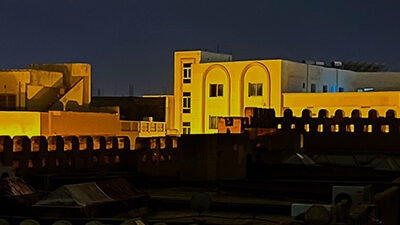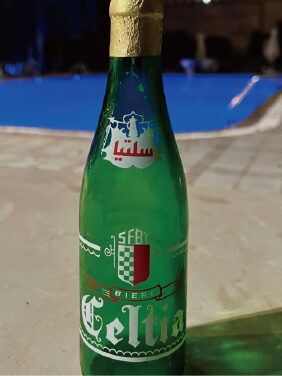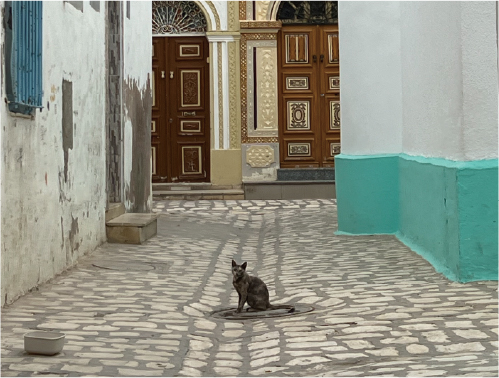まだまだ、チュニジアの魅力は尽きない。
Column|2025.3.20
Text_Toshinori Okada
Photo_Toshinori Okada
今回の特集記事では書ききれなかったチュニジアの話をこちらのコラムで。
1つめは「アルコール」。チュニジアはイスラムの国であり、イスラム教では飲酒は禁じられている。でもチュニジアのほとんどの街では普通にアルコールが飲める。それどころか、チュニジアワインは有名だし「セルティア」という美味しいビールも製造されている。ただ、スーパーでは置いていないところのほうが多いかも知れない。もし置いてあっても、酒売り場だけが別室になっていて、イスラムの金曜礼拝の日は扉が閉められる。この日はアルコールを買うことも店で飲むこともできない。※イスラム教では、週に一度は休肝日がとれることになっている。
2つめは「アザーン」。アザーンとは礼拝の開始を告げる呼び声。礼拝は1日5回、夜明け前と昼、午後、夕方、夜にあり、その度に街じゅうに響き渡る。アザーンは、街によってはおっさんのがなり声のようなのもある。拡声器を使って大音量で流すからそうなるのかも知れないが、そんなアザーンで目覚めたら、エキゾチックな気分も台無しになる。
3つめは「ゴミ」。チュニジアではゴミ処理で日本と協働。廃棄物の最終処理技術として国際的な評価を得ている「福岡方式」を活用したゴミ処理プロジェクトを実施している。このプロジェクトは、日本が海外の国と協力して温室効果ガスの排出削減を実施し、その削減分を両国で分け合う制度(JCM)の枠組みに基づいている。日本人の知らないところで日本が活躍していることを知ると、ちょっとうれしい。
4つめは「ハリッサ」。本誌今号の「旅する餃子」でも紹介されている唐辛子をベースにしたペースト状の調味料。これがとても優れものなのだ。チュニジア料理の多くはオリーブオイルをたっぷり使った、比較的あっさりしたものが多い。人によっては薄味と思えるものもある。そんなとき、このハリッサを投入してピリ辛に。チュニジア旅行中にすっかりはまってしまい、チュニスのスーパーで大量に買い込み、日本に帰ってきてからはサラダや肉料理からラーメンまで大活躍、いまや食卓になくてはならない調味料になっている。
他にも魅力がたくさんある愛すべきチュニジア。出会った人たちはみんな日本人を歓迎してくれた。 たくさんの笑顔が忘れられない。
※ホテルのバーなどでは飲めるところもある。
The allure of Tunisia is inexhaustible.
This column shares additional information about Tunisia that could not be included in the feature article.
First, let’s talk about alcohol. Tunisia is an Islamic country, and while Islam prohibits drinking, alcohol is widely available in most cities. Tunisia is known for its wines and produces the popular beer Celtia. However, many supermarkets don’t stock alcohol, and those that do often keep it in a separate room. On Fridays, the Islamic day of congregational prayer, these sections are closed, and alcohol cannot be purchased or consumed in regular establishments.* In Islam, a weekly alcohol-free day is essentially built into the culture.
Second, let’s talk about Azan. The Islamic call to prayer, Azan marks the start of the five daily prayers—before dawn, midday, afternoon, sunset, and night—echoing throughout the city each time. In some places, it sounds like a gruff old man’s call, likely due to loudspeakers at full volume. Waking up to one of those isn’t exactly the most exotic experience.
Third, let’s talk about trash. Tunisia collaborates with Japan in waste management, adopting the Fukuoka Method, an internationally recognized landfill system, as part of a joint project for sustainable waste disposal. This initiative is part of the Joint Crediting Mechanism (JCM), where Japan partners with other nations to reduce greenhouse gas emissions and shares the resulting reduction credits. Knowing that Japan is making a difference in places we rarely hear about is quite uplifting.
Fourth, let’s talk about harissa. This chili-based condiment, featured in this issue’s Traveling Dumplings segment, is a game changer. Tunisian cuisine is generally light, with generous use of olive oil but relatively mild flavors. For some, it may even feel under-seasoned. That’s where harissa comes in—adding a bold, spicy kick. During my trip, I got completely hooked. I ended up buying loads of it at a supermarket in Tunis, and now, back in Japan, it has become a kitchen staple—from salads and meat dishes to even ramen.
And still, Tunisia has much more to offer. Everyone I met was incredibly welcoming to the Japanese. The many smiles I encountered will stay with me forever.
*Some hotel bars do serve alcohol even on Fridays.

夜明け前、街に響き渡るアザーンに起こされる

チュニジアで
一番有名なビール「セルティア」。

ゴミのない街を目指して、日本と協働。

ハリッサは食卓に欠かせない。


